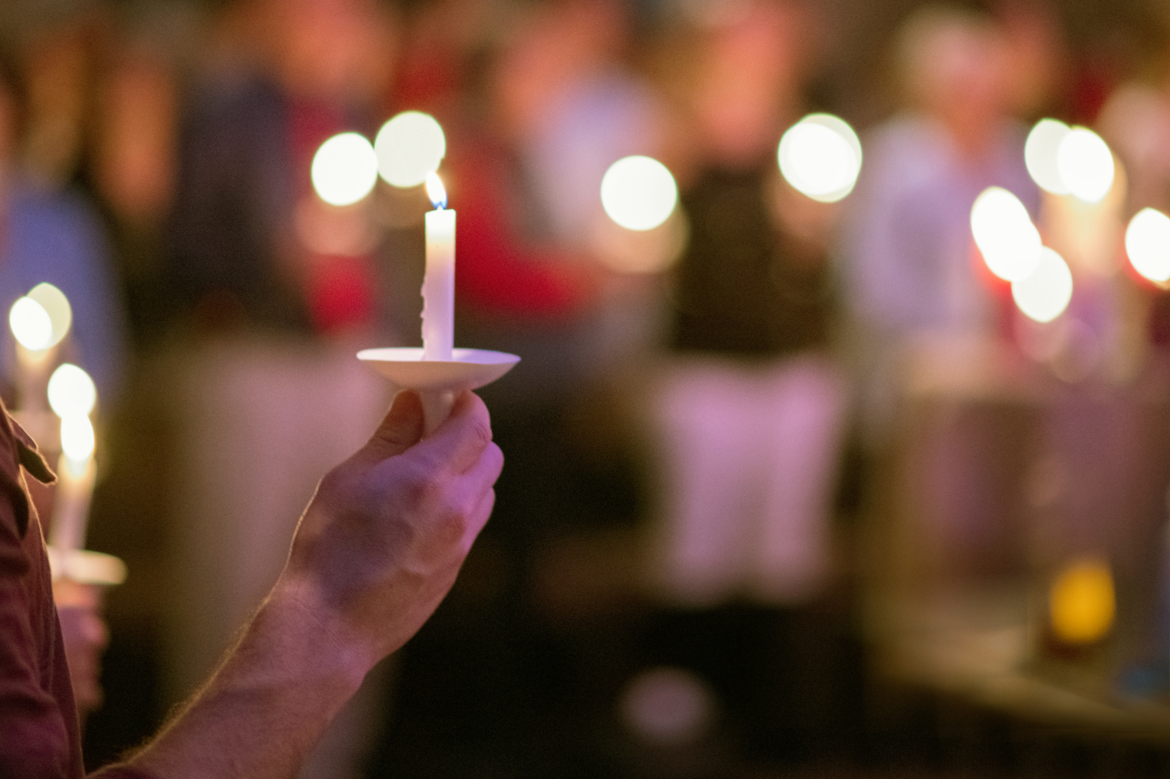As a child and young adult, I always looked forward to the holidays, enjoying the festivities, time with family, and the traditions we shared. In 2007, I had a new take on the holidays. I did not want them to happen. Earlier that year, my family had experienced a sudden, unexpected tragedy, and my brother Aaron was no longer with us. Most of the time, I was consumed with grief, and I felt guilty if I ever felt joy or happiness. As I watched others preparing for the holiday season with excitement, I felt disconnected – like the world was moving on, and I was in slow motion. Experiencing the holidays without Aaron felt wrong. His absence that I had barely tolerated for the past few months would now be magnified. I was afraid of what it would be like, and it was hard to know what to expect in the moment. It was exhausting to even think about. Instead, I wanted to just find a quiet cave and hibernate. Better yet, let’s just fast forward past the holidays and into a new year. But that also felt strange. A new year, one in which my brother had not lived, was hard to comprehend.
Maybe you, too, have recently lost someone through death or the dissolution of a relationship. Or you may be grieving anticipated loss because of a terminal illness in a loved one or yourself. You may be watching someone you care about grieve, unsure of how to help them. As we approach the holidays, you might be wondering how you will survive them. You can, but it may be challenging. I hope this blog provides a resource to support you on your grief journey this holiday season.
What Grief Is
According to the American Psychological Association (APA), grief is “the anguish experienced after significant loss, usually the death of a beloved person.” Grief can also involve regret for something lost (e.g., relationship), remorse for something done, or sorrow for a mishap to oneself (i.e., fertility). We can also grieve an anticipated loss, such as our own death or the death of a loved one, such as in the case of terminal illness. In other words, grief is the human response to loss. It is universal. We all experience grief. In the case of death of a person or relationship, it is our “evidence” that we loved someone, and that person’s life was intertwined and meaningful to ours.
More than 60 years ago, Dr. Elizabeth Kubler-Ross coined the Five Stages of Grief:
- Denial
- Anger
- Bargaining
- Depression
- Acceptance
This understanding of grief as a process and not a sequential order is still widely accepted today. For example, we might “redo” a phase, go through the phases in a different order than someone else, or spend more time in one phase. Some people may seem like they are okay or doing better than expected but then experience delayed grief weeks or months after the loss. There is no right or wrong way to do it. We are never done with grief. It becomes part of our story, but it does not (and should not) define us.
How We Experience Grief
Grief can include emotional, physical, cognitive, behavioral, and social aspects. You may experience shock, numbness, sadness, mood changes, guilt, anger, irritability, or difficulty enjoying things. Physical symptoms can include lack of energy and feeling tired, nausea, headaches, restlessness, upset stomach, changes in appetite and sleep, chest pain or tightness. The stress of grief can overload the nervous system and weaken the immune system, making it more likely for us to get sick. You may also have confusion, trouble thinking or making decisions, difficulty focusing or remembering things. After Aaron died, I often forgot my thought mid conversation. I felt like my brain was firing on only a few cylinders, much of the time in a fog. It is also common to have a lost sense of purpose or hope, spend a lot of time thinking about the past, and worrying about the future. People who are grieving may have anxiety over separating from loved ones who are still here and constantly want to be around others, even if they don’t feel like interacting. The idea of being alone makes them uncomfortable. Others avoid social situations because conversations with others are tiresome, or the stimulation of other conversations, noises, etc. seems overwhelming.
Thoughts and emotions may also be conflicting and/or confusing. For example, the experience of sadness and relief over a loved one who had a lengthy illness resulting in death. Others feel sadness and regret while mourning the loss of a complicated relationship. When a romantic relationship ends, someone might feel both lonely and hopeful about connecting with someone new. I mentioned earlier that I felt joy and laughter in the moment and then felt guilty for having fun.
How To Cope with Grief During the Holidays
I did survive the 2007 holiday season. But, not without experiencing joy and sadness, sorrow, guilt, anger – all the things. Here are some ideas that might support you as you navigate your grief journey, especially this holiday season when you might be more sensitive. Remember that each person’s grief journey is different, and making choices that support your needs will help you walk through this in a way that strengthens you.
Think about how you would like the holidays to look this year.
- Are there activities or traditions that you would like to keep?
- Which ones are too painful, and you’d like to avoid them this year?
- What new traditions or activities would you like to do this year?
- Consider reducing your commitments from your typical holiday schedule. While the frequent activities may seem appealing, a busy season could also be overwhelming this year. Overscheduling may also make it difficult to find the space to express your emotions in a healthy way, causing them to build up and come out in ways that are unhelpful (e.g., yelling at someone because you are overwhelmed).
- Make a plan so that you know what to expect and you are not making choices in a moment when you are experiencing strong emotions. Discuss your preferences with your friends and family and ask in advance for flexibility and patience. It is important to surround yourself with people who can give you the space that you request but are also available to support you in the ways that you need. If your family disagrees about how to experience the holidays, consider seeking help from a behavioral health professional (e.g., counselor, therapist) in creating a plan that seems comfortable for everyone.
- Be gentle with yourself. Allow time for your thoughts and feelings to come out. Think about the ways you are comfortable expressing them. For some, journaling is a way to do this. Or consider talking about them aloud with someone who supports you. This could be a friend, family member, spiritual advisor, therapist/counselor, etc.
- If it feels comfortable, talk about the person that you’ve lost. Tell stories about them. Say their name aloud. Share your favorite memories. Consider doing something in their memory, such as:
- Light a candle
- Donate money or time in their name
- Engage in an activity that you enjoyed doing with them
- Pause regularly to assess your stress level. Listen to your body, and respect what it is telling you. Take a deep breath. Do you need rest? Find a quiet space to unwind, even if it’s just for 10-15 minutes. Creating margins in your day to take care of yourself can help you feel more equipped to experience what comes next. Do you need social interaction? Call a friend and have coffee.
- Consider maintaining consistent schedules for meals, sleep, and movement. Biologically, our bodies thrive on routine. Also, knowing what to expect improves your sense of control. This is especially important during a time when you might feel like you don’t have control over what happened or your emotions. For more information on routines, sleep, nutrition, and physical activity, check out our other blogs.
- Take one day at a time. Schedule things that you enjoy. For example, make a favorite holiday snack, drive around and look at holiday lights, watch a favorite movie. Even if you don’t feel like it initially, once you start the activity or after you finish it, you will likely feel better. Set a small goal each day, such as taking a walk or calling a friend. Accomplishing small goals can give you a sense of purpose and self-confidence.
Additional Resources
-
- https://my.clevelandclinic.org/health/diseases/24787-grief
- https://www.nia.nih.gov/health/grief-and-mourning/coping-grief-and-loss
When To Seek Professional Help
That first six months to a year is raw and so painful. There are so many milestones and “firsts” – first birthday, a new calendar year, etc. I still miss Aaron every day, but the intensity of my grief has lessened over the years. When I experience grief now, it is easier to move on. One of my favorite illustrations of this is a quote by Rachel Joyce in The Unlikely Pilgrimage of Harold Fry.
“It’s like discovering a great hole in the ground. To begin with, you forget it’s there and keep falling in. After a while, it’s still there, but you learn to walk round it.”
For some, the intensity of their grief doesn’t get any better over time or they have experienced extreme situations. In these cases, professional guidance is recommended:
- Traumatic grief – grief following a traumatic experience and loss, which may be accompanied by post-traumatic stress symptoms (e.g., flashbacks or nightmares about what happened, avoidance of situations or memories associated with the trauma)
- Complicated or prolonged grief – extreme, persistent grief that keeps a person from completing their responsibilities (> 6 months in youth; >1 year in adults)
- Suicidal ideation – thoughts of and/or plans for own death, hurting oneself
—
About the Author
Janelle Wagner Ph.D., serves on the Professional Development Team as an Associate Trainer and Consultant for PracticeWise. Learn more about Dr. Wagner on the PracticeWise team page.







